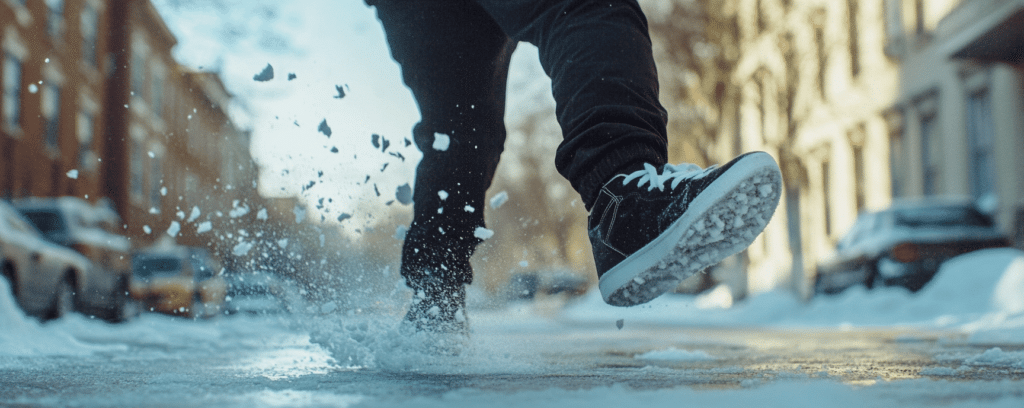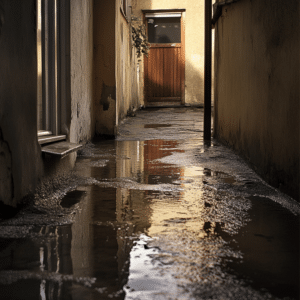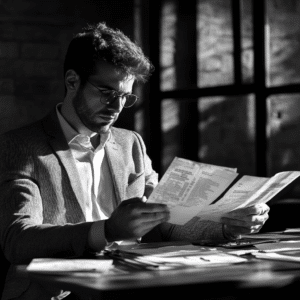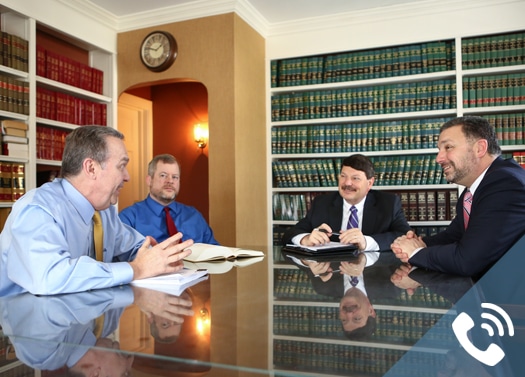Can You Sue a Company If You Fall on Their Property? Legal Options Explored
Last updated Tuesday, December 10th, 2024

If you fall on a company’s property, can you sue a company if you fall on their property for your injuries? Yes, you can often sue if the fall was due to the company’s negligence. This article will explain the legal grounds needed to file a lawsuit, how to prove negligence, and the steps you should take if you decide to pursue a personal injury claim.
Key Takeaways
- Slip and fall accidents on business property can lead to premises liability claims, where owners are responsible for maintaining safe environments for visitors.
- Proving negligence involves establishing a duty of care, breach of duty, causation, and damages, along with gathering essential evidence to support your claim.
- Engaging a personal injury lawyer can enhance your chances of success in slip-and-fall cases by guiding the legal process, negotiating settlements, and preparing for trial.

Get Your FREE Case Review,
In Person or Virtually Online
Understanding Slip and Fall Accidents on Business Property
Slip and fall accidents are incidents where an individual suffers an injury due to slipping on a hazardous surface on someone else’s property. Such incidents frequently occur on business premises, where substances like ice, oil, or grease pose significant risks. Property owners, including business owners, are legally obligated to ensure their premises are safe for visitors. This obligation is particularly significant for business invitees, who are entitled to the highest level of care.
A slip-and-fall accident can result from various hazardous conditions, such as wet floors, broken sidewalks, or poorly maintained parking lots. Property owners must regularly inspect their premises for potential dangers and either repair these hazards or warn visitors about them within a reasonable timeframe. Failure to do so can lead to serious injuries, for which the property owner might be held responsible.
Consider a scenario where you enter a store on a rainy day, and the owner hasn’t placed mats at the entrance or wet floor signs. Consequently, you slip on the wet floor and get injured. In this scenario, the store owner could be held liable for your injuries due to their negligence in maintaining a safe environment for visitors.
Grasping the responsibilities of property owners is vital for those who have experienced a slip and fall accident. Realizing that property owners must ensure safe premises can empower you to pursue justice and compensation after a fall on someone else’s property.
Legal Grounds for Suing a Company After a Fall

Successfully suing a company after a fall requires proving that the property owner’s negligence directly caused your injuries. This involves proving that the property owner acted carelessly or failed to act to prevent a hazardous situation.
The crux of a successful premises liability claim is establishing a connection between the negligent actions of the property owner and the injuries sustained by the victim. For instance, if a store owner neglects to fix a broken sidewalk, and you trip and fall as a direct result, you have a strong basis for a personal injury claim.
Financial compensation for your injuries can cover medical expenses, lost income, and pain and suffering.
A personal injury lawyer can guide you through the complexities of a premises liability lawsuit, ensuring you meet all legal requirements and deadlines while building a strong case.
Proving Negligence in Slip and Fall Cases
Proving negligence is a critical aspect of any slip and fall accident case. Four elements must be established: duty of care, breach of duty, causation, and damages. Property owners must ensure their premises are safe for visitors, meaning they should be aware of hazards or discover them through regular inspections.
A breach of duty occurs when a property owner fails to address known hazards or maintain safe conditions, leading to a slip-and-fall incident. For instance, a business owner aware of a broken sidewalk but failing to repair it, resulting in a visitor tripping and falling, constitutes a breach of duty. The claimant must then demonstrate that the accident occurred as a direct result of this failure and that they suffered damages, such as medical expenses and lost income.
The burden of proof lies with the injury victims, who must show that the property owner knew the property owner’s negligence led to their injuries on private property. This process can be challenging, especially if the hazard is temporary or the property owner argues that they did not have enough time to address it.
Nonetheless, with the right evidence and legal support, proving negligence is possible and essential for a successful personal injury lawsuit.

Get Your FREE Case Review,
In Person or Virtually Online
Steps to Take Immediately After a Fall Accident
If you experience a slip and fall accident, taking the right steps immediately afterward is crucial for your health and any potential legal action. First and foremost, seek medical attention promptly. This step is vital for your well-being and provides documentation of your injuries, which is critical for your personal injury claim.
Photograph the scene of the incident and your injuries. These photos can serve as crucial evidence, illustrating the hazardous conditions that led to your fall. Additionally, retain the clothing and footwear you were wearing during the fall, as they can help demonstrate the circumstances of the accident.
Report the incident to the business management where the fall occurred and obtain a copy of the accident report. Be cautious about making statements that could assign or accept blame until the case is reviewed.
Following these steps can significantly strengthen your premises liability claim by providing clear and compelling evidence of the accident and its aftermath.
Gathering Evidence for Your Personal Injury Claim
Collecting evidence is essential for building a strong personal injury claim after a slip and fall accident. Key evidence includes incident reports, witness testimonies, and maintenance records, which help establish the property owner’s negligence. Medical records are crucial as they detail your injuries and treatments, supporting your claim’s validity.
Witness statements are invaluable as they provide testimonial evidence of what occurred during the accident. Collecting photos and videos from the accident site can visually demonstrate the hazardous conditions that caused your fall. Personal narratives or victim statements should be documented promptly to capture accurate details of the incident.
Keep a comprehensive file of all documents related to the accident. This includes medical bills, correspondence with the property owner’s insurance company, and any other evidence that supports your claim. Meticulously gathering and organizing this evidence can help you build a compelling case for financial compensation.
The Role of a Personal Injury Lawyer
Engaging a personal injury lawyer can significantly enhance your chances of success in a slip-and-fall case. A premises liability lawyer can guide you through the legal process, ensuring compliance with all requirements and deadlines. They can also help gather essential evidence, such as security camera footage and witness statements.
Personal injury lawyers possess strong negotiation skills and can effectively counter tactics used by insurance companies to minimize payouts. They negotiate settlements on your behalf, protecting you from low offers and ensuring fair compensation. If the case goes to trial, having a skilled personal injury attorney ensures robust representation in court.
Additionally, many personal injury lawyers operate on a contingency fee basis, meaning they only get paid if you win your case. This arrangement makes legal representation accessible and reduces financial stress for injury victims. Hiring a knowledgeable and experienced lawyer allows you to focus on recovery while they handle your legal claim’s complexities.
Compensation You Can Seek for a Slip and Fall Accident

Lost income, both past and future, includes wages lost due to missed work and potential future earnings if your injuries affect your ability to work. You may also seek non-economic damages for emotional suffering and diminished quality of life resulting from your injuries.
Punitive damages may be awarded if the property owner exhibited willful or reckless behavior leading to the accident. Additionally, out-of-pocket expenses directly related to the injury, such as modifications to your home, can be part of your compensation claim.
Knowing the full scope of potential compensation can help you pursue the financial recovery you deserve.
How Long Do You Have to File a Lawsuit?
Filing a personal injury lawsuit for a slip and fall accident must be done promptly. Each state has a statute of limitations setting the time limits for legal action. Failing to file within this period typically results in your case being dismissed. Procedural defenses, such as naming the wrong defendant or missing the statute of limitations, can also lead to dismissal.
Special rules may apply, such as pausing the statute of limitations if the injured party is a minor or mentally incapacitated. If the slip and fall occurred on government property, a notice of claim must usually be submitted within 90 days, followed by a lawsuit within a year and 90 days.
Knowing these time limits is essential to preserving your right to seek compensation.
Common Defenses Used by Companies in Slip and Fall Cases
Companies often employ several defenses in slip-and-fall cases to avoid liability. A common defense is that the business owner promptly inspected and addressed hazards, arguing that any dangerous condition was managed and thus, they were not negligent.
Another defense is that the slip and fall occurred without any negligent conditions on the property. Defendants may claim inadequate notice of the hazard, arguing they were unaware of it and couldn’t have reasonably addressed it before the accident.
Intervening factors, such as other customers creating hazards, can lessen or eliminate a business owner’s liability. Knowing these common defenses can help you and your legal team prepare a robust case to counter them.
What to Expect During the Legal Process
The legal process for a slip-and-fall case starts with filing a complaint, leading to stages that may extend over a year or more. During discovery, both parties share information about the case, helping build their respective arguments.
If both parties agree on a settlement, the case ends without further litigation, providing a quicker resolution. Negotiating a settlement is often faster and less costly than going to trial, benefiting both parties.
If a settlement cannot be reached, the case may proceed to trial, potentially taking several months to years to resolve. Knowing these steps and the potential timeline can help you prepare for what lies ahead in your legal journey.

